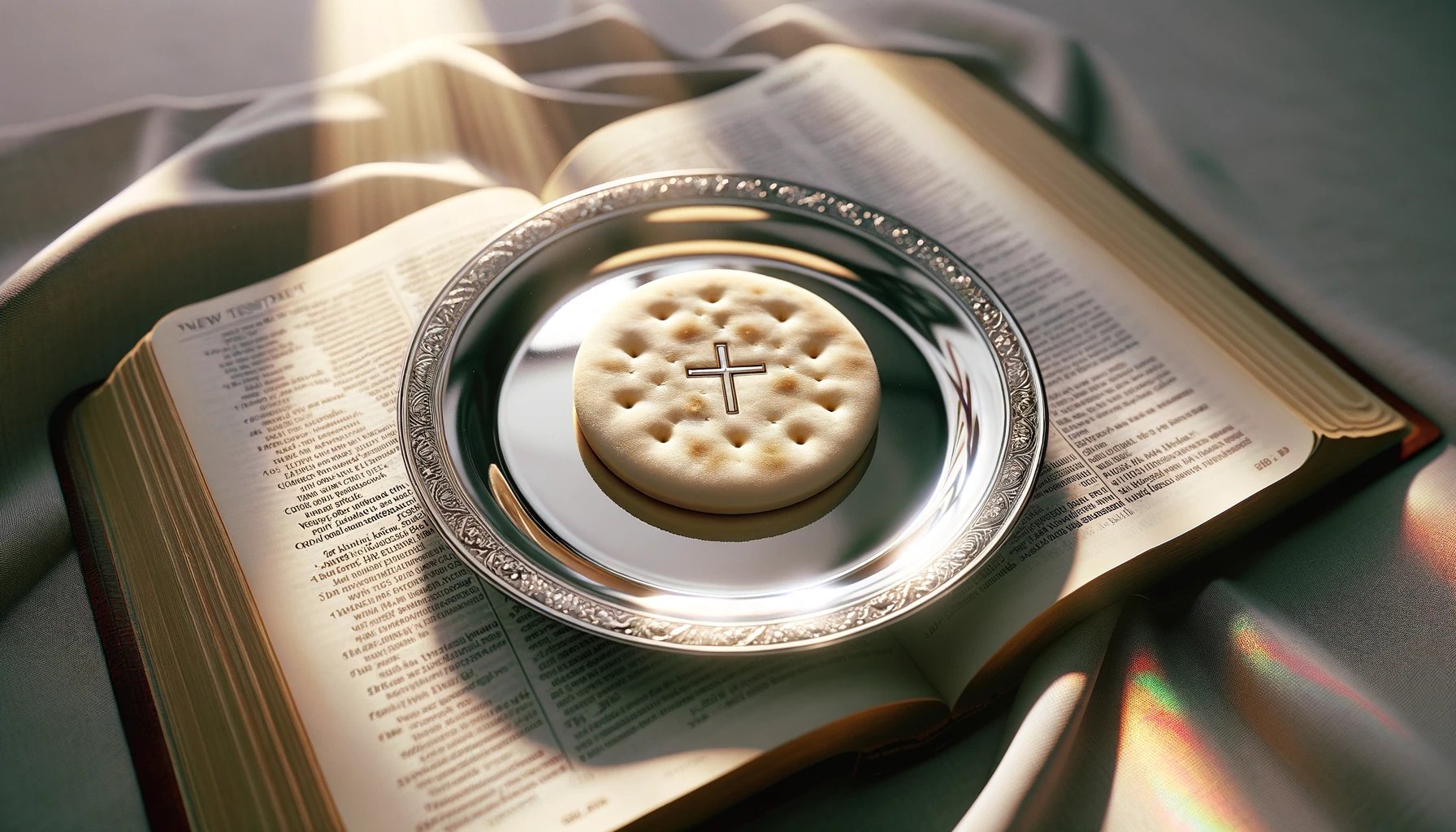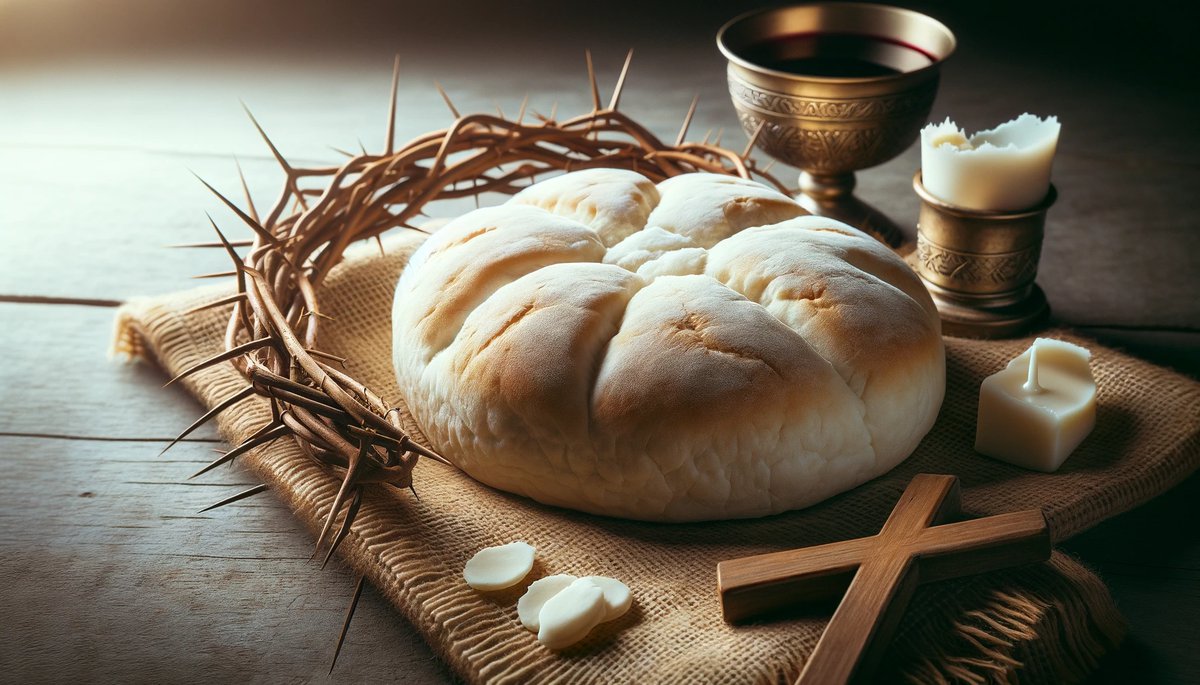Home>Theology and Spirituality>What Does The Bread Represent In Communion


Theology and Spirituality
What Does The Bread Represent In Communion
Published: February 19, 2024
Ericka Andersen, an editor at Christian.net, expertly merges digital strategy with content creation, focusing on faith and societal issues. Her communication skills enhance the platform's engaging narratives, fostering meaningful dialogue on belief's impact on society.
Discover the significance of bread in communion and its theological and spiritual implications. Explore the deeper meaning behind this sacred practice. Gain insights into theology and spirituality.
(Many of the links in this article redirect to a specific reviewed product. Your purchase of these products through affiliate links helps to generate commission for Christian.net, at no extra cost. Learn more)
Table of Contents
Introduction
The act of communion, also known as the Lord's Supper or the Eucharist, holds profound significance in Christian faith and practice. At the heart of this sacred ritual is the consumption of bread and wine, which are imbued with deep spiritual symbolism. In this article, we will explore the multifaceted meaning of bread in the context of communion, shedding light on its historical, symbolic, and spiritual significance.
The communion ritual, instituted by Jesus Christ during the Last Supper, has been faithfully observed by Christians for centuries. It serves as a poignant reminder of Christ's sacrificial death and resurrection, as well as a symbol of unity among believers. Central to this ritual is the consumption of bread, which holds a rich tapestry of meaning that transcends mere sustenance. As we delve into the historical, symbolic, and spiritual dimensions of bread in communion, we will uncover the profound truths and timeless significance encapsulated in this simple yet profound element.
The Historical Significance of Bread in Communion
The historical significance of bread in communion is deeply rooted in the origins of the Christian faith and the teachings of Jesus Christ. The practice of using bread as a central element in communion can be traced back to the Last Supper, a momentous event in Christian history. It was during this sacred meal that Jesus, in the presence of his disciples, instituted the practice of communion by breaking bread and sharing wine, instructing his followers to partake in remembrance of him.
The act of breaking bread and sharing it with his disciples held profound significance, as it symbolized the impending sacrifice of Christ's body for the redemption of humanity. This pivotal moment not only foreshadowed the crucifixion but also established a timeless ritual that would be observed by believers throughout the ages. The use of bread as a focal symbol in communion underscores its foundational role in Christian tradition and its enduring significance as a representation of Christ's sacrificial love and atonement.
Furthermore, the historical significance of bread in communion is intricately linked to the cultural and religious practices of the time. In the Jewish tradition, the consumption of bread held deep spiritual and communal significance, particularly during the observance of Passover. Jesus, in his wisdom, imbued this familiar element with new meaning, transforming it into a powerful symbol of his impending sacrifice and the establishment of a new covenant between God and humanity.
As Christianity spread and evolved, the practice of communion and the use of bread as a central symbol became integral to the identity of the faith. The early Christian communities upheld the tradition of breaking bread in remembrance of Christ, fostering a sense of unity and shared devotion among believers. This historical continuity underscores the enduring significance of bread in communion, as it serves as a tangible link to the foundational events of the Christian faith and the teachings of Jesus Christ.
In essence, the historical significance of bread in communion is deeply intertwined with the origins of Christian practice, the teachings of Jesus Christ, and the cultural context in which the ritual was established. Through its historical continuity and enduring relevance, bread in communion continues to serve as a poignant reminder of Christ's sacrificial love and the unifying bond of faith that transcends time and tradition.
The Symbolism of Bread in Communion
The symbolism of bread in communion encompasses a rich tapestry of spiritual significance that resonates deeply within Christian theology and practice. At its core, bread serves as a powerful symbol of sustenance, unity, and spiritual nourishment, carrying profound meaning within the context of communion.
First and foremost, bread symbolizes sustenance and nourishment, both physical and spiritual. Just as bread provides essential sustenance for the body, it also represents the spiritual sustenance offered through the body of Christ. In partaking of the bread during communion, believers symbolically partake of the spiritual nourishment and sustenance derived from their faith in Christ. This act serves as a poignant reminder of the sustaining power of Christ's presence in the lives of believers, offering strength, comfort, and renewal.
Moreover, bread holds a symbolic significance in its representation of unity and community. The act of breaking bread together during communion reflects the communal aspect of the Christian faith, emphasizing the shared bond and fellowship among believers. As the bread is broken and distributed among the faithful, it signifies the unity of the body of Christ, transcending individuality and fostering a sense of communal participation in the redemptive work of Christ. This symbolism underscores the interconnectedness of believers within the larger spiritual family, reinforcing the notion of shared faith and collective identity.
Furthermore, bread symbolizes the body of Christ, representing his sacrificial love and atoning work on the cross. As believers partake of the bread, they are reminded of Christ's selfless sacrifice and the redemptive significance of his body offered for the forgiveness of sins. This profound symbolism underscores the central tenet of Christian faith, encapsulating the essence of Christ's redemptive mission and the transformative power of his atoning sacrifice.
In addition, the symbolism of bread in communion extends to the concept of spiritual nourishment and growth. Just as physical bread sustains the body, the spiritual bread offered in communion serves to nourish and strengthen the faith of believers. Through partaking of the bread, believers are invited to experience spiritual renewal, growth, and a deepening of their relationship with Christ, reinforcing the transformative power of communion as a source of spiritual nourishment.
In essence, the symbolism of bread in communion encompasses a multifaceted representation of sustenance, unity, sacrificial love, and spiritual nourishment. Through its rich symbolism, bread serves as a powerful conduit for conveying the foundational truths of the Christian faith, inviting believers to partake in a profound spiritual communion with Christ and one another.
The Spiritual Meaning of Bread in Communion
The spiritual meaning of bread in communion transcends its physical form and delves into the realm of profound symbolism and spiritual significance. At the heart of this symbolism lies the transformative power of Christ's presence and the redemptive narrative woven into the fabric of Christian faith.
First and foremost, the bread in communion symbolizes the body of Christ, representing his selfless sacrifice and the redemptive significance of his earthly mission. As believers partake of the bread, they are invited to reflect on the profound act of love and atonement demonstrated through Christ's sacrificial offering. This spiritual symbolism underscores the foundational tenet of Christian faith, emphasizing the transformative power of Christ's body given for the forgiveness of sins and the reconciliation of humanity with God.
Moreover, the spiritual meaning of bread in communion extends to the concept of spiritual nourishment and sustenance. Just as physical bread provides sustenance for the body, the spiritual bread offered in communion serves as a source of nourishment for the soul. Through partaking of the bread, believers are invited to experience spiritual renewal, strength, and a deepening of their faith in Christ. This act of communion becomes a profound spiritual encounter, where believers are nourished and sustained by the abiding presence of Christ, finding solace and strength in the spiritual sustenance offered through the symbolic consumption of bread.
Furthermore, the spiritual meaning of bread in communion underscores the concept of unity and communal participation in the redemptive work of Christ. As the bread is broken and shared among believers, it symbolizes the unity of the body of Christ, transcending individuality and fostering a sense of communal participation in the redemptive narrative. This spiritual symbolism emphasizes the interconnectedness of believers within the larger spiritual family, reinforcing the shared faith and collective identity that binds them together in Christ.
In essence, the spiritual meaning of bread in communion encompasses a profound representation of Christ's sacrificial love, spiritual nourishment, and communal unity. Through its rich spiritual symbolism, bread serves as a powerful conduit for believers to engage in a transformative encounter with the redemptive narrative of Christ, finding sustenance, renewal, and unity in the spiritual communion experienced through the consumption of bread in the sacred ritual of communion.
The Importance of Bread in Communion Today
In contemporary Christian practice, the significance of bread in communion remains deeply profound and relevant, serving as a poignant reminder of the enduring truths and spiritual nourishment encapsulated in this sacred ritual. The continued importance of bread in communion today is rooted in its ability to evoke a sense of spiritual connectedness, renewal, and communal participation among believers.
One of the paramount reasons for the enduring importance of bread in communion lies in its capacity to foster a profound sense of spiritual connectedness with Christ and fellow believers. As individuals partake of the bread during communion, they are invited to enter into a deeply personal and transformative encounter with the redemptive narrative of Christ. This act of communion serves as a tangible expression of spiritual nourishment and sustenance, offering believers a moment of intimate connection with the sacrificial love and atoning work of Christ. In a world marked by fragmentation and disconnection, the act of partaking of the bread in communion serves as a powerful symbol of unity, fostering a sense of shared faith and communal participation in the redemptive story of Christ.
Furthermore, the importance of bread in communion today is underscored by its role in facilitating spiritual renewal and growth within the faith community. As believers partake of the bread, they are invited to reflect on the transformative power of Christ's presence in their lives, finding strength, comfort, and renewal in the spiritual sustenance offered through this sacred act. The communion ritual becomes a source of spiritual nourishment, where individuals are invited to experience a deepening of their faith, a renewed sense of purpose, and a rekindling of their spiritual journey. In a fast-paced and often tumultuous world, the act of partaking of the bread in communion offers believers a sanctuary of spiritual renewal and growth, providing a space for introspection, restoration, and recommitment to their faith.
Moreover, the importance of bread in communion today extends to its role in fostering communal participation and unity within the body of Christ. As believers gather to partake in the ritual of communion, the sharing of bread becomes a tangible expression of their shared identity and faith. The act of breaking bread together underscores the communal aspect of the Christian journey, emphasizing the interconnectedness of believers within the larger spiritual family. Through this communal participation, individuals are reminded of their shared commitment to the redemptive work of Christ and their collective identity as members of the body of Christ, transcending barriers of division and fostering a sense of unity and fellowship.
In essence, the importance of bread in communion today lies in its ability to evoke a profound sense of spiritual connectedness, renewal, and communal participation among believers. Through its enduring significance, the act of partaking of the bread in communion continues to serve as a timeless expression of spiritual nourishment, unity, and communal participation in the redemptive narrative of Christ, enriching the faith journey of believers and fostering a deeper sense of spiritual connectedness within the body of Christ.
Read more: What Does A Communion Wafer Represent
Conclusion
In conclusion, the significance of bread in communion transcends mere symbolism, historical tradition, and spiritual meaning. It embodies the essence of the Christian faith, encapsulating the sacrificial love, redemptive narrative, and communal unity at the heart of the Christian journey. From its origins in the Last Supper to its enduring relevance in contemporary Christian practice, bread in communion serves as a tangible link to the foundational truths and timeless significance of Christ's atoning sacrifice.
The historical significance of bread in communion, rooted in the teachings of Jesus Christ and the cultural context of the time, underscores its enduring relevance as a symbol of Christ's sacrificial love and the establishment of a new covenant. The act of breaking bread and sharing it with his disciples during the Last Supper laid the foundation for a ritual that would be faithfully observed by believers throughout the ages, fostering a sense of historical continuity and spiritual connection to the foundational events of the Christian faith.
Furthermore, the symbolism of bread in communion encompasses a rich tapestry of spiritual significance, representing sustenance, unity, sacrificial love, and spiritual nourishment. It serves as a powerful conduit for conveying the foundational truths of the Christian faith, inviting believers to partake in a profound spiritual communion with Christ and one another. The act of partaking of the bread becomes a transformative encounter, where believers are nourished and sustained by the abiding presence of Christ, finding solace, strength, and renewal in the spiritual sustenance offered through this sacred ritual.
In contemporary Christian practice, the importance of bread in communion remains deeply profound and relevant, serving as a poignant reminder of the enduring truths and spiritual nourishment encapsulated in this sacred ritual. It fosters a profound sense of spiritual connectedness, renewal, and communal participation among believers, offering a sanctuary of spiritual renewal and growth in a world marked by fragmentation and disconnection.
In essence, the significance of bread in communion extends far beyond its physical form, serving as a tangible expression of the transformative power of Christ's presence and the unifying bond of faith that transcends time and tradition. As believers partake of the bread in communion, they are invited to enter into a deeply personal and transformative encounter with the redemptive narrative of Christ, finding sustenance, renewal, and unity in the spiritual communion experienced through this sacred act.














